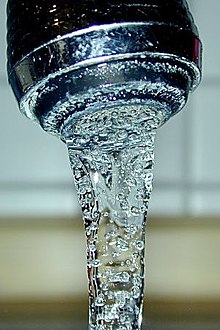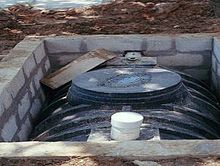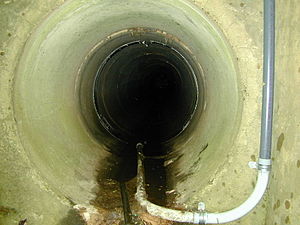This is the first post (excluding announcements and such) that I've written in quite a while, and I must apologize. Parts of this post are rather... crappy. No, not the quality (which I leave to you to decide), but the subject.
One issue many metropolitan areas face, especially those (such as Portland) which are constrained by geography or law, is the wailing and gnashing of teeth that occurs when areas which were previously rural, become urbanized. Much of this upset is understandable--people who are able to afford to do so often live in a place which suits their preferred lifestyle (good or bad), and react strongly when someone proposes upsetting their apple cart. Annexation by a city and upzoning, two things which frequently happen as urban areas expand, are particular sources of upset. Some objections are rooted in fears and feelings of the unknown--a natural action when one's home is perceived to be under threat.
But many objections are financial. Cities generally levy higher taxes, and many rural and suburban-fringe dwellers don't care one whit (or may view as hostile) urban services such as sidewalks, stricter code enforcement, parks, libraries, and the like. (And in some cases, free-riding on the nearby city is possible). This post discusses one common financial objection to urbanization, along with ways to mitigate it. The objection?
The sewer.
What goes in, must come out
 |
| Image courtesy Wikipedia |
Why?
It isn't due to different prices for H2O; or because the local water officials here are incompetent. (Indeed, their water provider, Clackamas River Water, has a knack for getting in the news for all the wrong reasons).
It's because I (and other city-dwellers) don't just get charged for the water that comes into our homes--we also get charged for the water that comes out.
The City of Beaverton water and sewer department charges an US$8/month base fee for most users, plus $2.22 per unit of water. (One unit = 100 cubic feet = 748 US gallons = 2831.5 liters, for those keeping score at home). But that's not all. The sewer rate is nearly $25 per month plus $1.50 per unit of water consumed, though only water use in the winter months is actually measured (based on the assumption that much water consumed in the summer is going on the lawn, not down the drain). But wait, there's more! There's also a surface water fee, for the storm drains and downspouts, based on the size of the footprint of the buildings and pavement on the property. Each 2640 square feet (or fraction thereof) of impervious surface costs $6.75.
Mom and Dad? They only pay for their water supply. Their sewage disposal needs are served by a septic tank in the backyard (they live on a 1/2 acre lot). Every five years or so, they have to pay for a honey truck to come out and pump out the tank (and occasionally endure tasteless remarks from the driver concerning the contents thereof), but other than that, it's free to them. The downspouts on their house, rather than leading into a storm system, lead into the garden. The streets in their neighborhood have a glaring excess of potholes--but a notable absence of manholes.
As they live on a 1/2 acre lot (in a subdivision which was built prior to Oregon's pioneering land use law in the early 1970s), this arrangement is probably satisfactory from an environmental point of view. Given that their neighborhood is located at a lower elevation than the nearest sewer line, it seems highly unlikely that sewers will be installed anytime soon. Unlike pressurized supply lines, which can be routed up hills, sewage pipes depend entirely on gravity (or on pump stations) for their flow. Sh*t decidedly does not roll uphill.
Fair?
But the big question which I now pose is: Is this arrangement equitable? I'm not complaining about my bill--one thing I think is generally a good public policy is to eliminate externalized costs. I, and other city residents with similar billing arrangements, are being charged for our contributions to the problem of sewage disposal, and the particulars of that arrangement--the more water you use, the more crap you're likely flushing down the toilet, therefore the more you pay--are entirely satisfactory. And sewer and storm infrastructure is expensive to build, install, maintain, and operate.
Instead, the question I ask is this: Should rural (and semi-rural) homeowners be exempt from paying sewage disposal costs? Obviously, they aren't "contributing" to the amount of stuff that goes into the sewers--and as noted above, there are many rural neighborhoods where installing sewers would be prohibitively expensive (and are low enough density that it isn't necessary). On the other hand, this arrangement creates an incentive to resist sewer installation when property on the fringe of a city becomes urbanized: from the point of view of a homeowner, a sewer connection is almost entirely a liability. The primary benefit of sanitary sewer systems--a clean water supplies--is enjoyed by everyone within a community, not just those hooked up to the sewer. And when excess numbers of septic tanks start resulting in polluted water supplies, it can get very expensive very quickly, as folks in east Multnomah County discovered some years ago.
A better way
So here's a quick and dirty proposal.
- All homeowners (and commercial customers as well) who are supplied potable water from utilities, ought to pay a waste disposal fee based on their wintertime water consumption--regardless of of how they dispose of toilet waste. (Differing arrangements ought to apply to agricultural and industrial water users, and those getting water from on-premises wells might be exempted as well--as might sufficiently low-density properties well outside of any urban area).
- Proceeds from waste disposal fees would be then dispersed to sewer and stormwater districts as appropriate to fund operations.
- In addition, some portion of the fees would be held in reserve to pay for expansions to sewerage systems, including covering the cost of residential conversions. This last item is important--in exchange for paying a waste disposal fee on the same terms as urban residents, rural and suburban residents would no longer need to worry about an unexpected four-figure bill for conversion of their home to sewer service. Other than a backhoe in the backyard, being hooked up to a sewer system would become a non-event for homeowners, rather than a potential financial catastrophe.
(Were I more cynical than I am, I might suggest that one of the primary benefits of a rural lifestyle is the abundant opportunities to externalize costs at a scale which would be intolerable in the city. Were I more charitable than I am, I might respond that rural communities often lack a critical mass of both capital and personnel to deal with these issues as efficiently as cities can).
To summarize. Disposal of sewage waste is a social problem, not an individual one. The preferred means for dealing with large amounts of the stuff is a large-scale communal system. The benefits are social as well--being hooked to the sewers confers little benefit on an individual homeowner, but having homeowners hooked to sewers confers a significant benefit to society at large. The current arrangement permits costs to be externalized, and creates a strong incentive for homeowners to resist the preferred solution (sanitary sewer systems) for urban environments. Thus, it strikes me as more equitable for everyone to be charged on the same schedule for sewage disposal and treatment, regardless of the particulars of their home's plumbing. Homeowners should pay a higher bill for flushing the loo more; but not be penalized simply because they happen to have a sewer connection.
The state of affairs we have today, essentially, constitutes a subsidy to rural areas at the expense of urban ones. (One of many such subsidies that could be written about).
Sorry about that, Mom and Dad.




No comments:
Post a Comment
Keep it clean, please